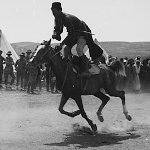Jigit Day Date in the current year: March 1, 2026
 Jigit Day is celebrated on March 1 in Ingushetia and Chechnia, two federal republics in Russia located in the North Caucasus. It is usually viewed as a local alternative to Defender of the Fatherland Day (February 23) because the date of the latter is associated with tragic events in the history of the Chechens and Ingush.
Jigit Day is celebrated on March 1 in Ingushetia and Chechnia, two federal republics in Russia located in the North Caucasus. It is usually viewed as a local alternative to Defender of the Fatherland Day (February 23) because the date of the latter is associated with tragic events in the history of the Chechens and Ingush.The word jigit, also spelled as dzhigit, zhigit, yigit or igid, can be translated from Turkic languages as “young man” or “fine lad”. Historically, the term was used in Central Asia and the Caucasus to refer to skilled and brave equestrians who were noted for their courage, endurance, and the ability to wield weapons.
Today, the word jigit has two meanings. In a general sense, it refers to men who embody a traditional model of manhood that implies courage, bravery, patriotism, and other “masculine” qualities. “Modern jigits” are not expected to be able to ride a horse or wield weapons. They just need to conform with the ideal of masculinity.
In a narrow sense, the term refers to equestrians who specialize in jigitovka, also known as jigiting. Jigitovka is a style of trick riding similar to equestrian vaulting. It originated in the Caucasus and Central Asia, and was later adopted by the Russian Cossacks from the Circassians. Jigitovka developed as a natural way of training the rider and the horse. Jigits are able to stand up at full gallop, pick up various objects from the ground, shoot targets, and perform other stunts.
Jigit Day originated during the Soviet era. It was a pan-Caucasian holiday that was first celebrated in Pyatigorsk in the spring of 1936. Almost 50,000 people gathered at the Pyatigorsk Racetrack to watch a spectacular parade featuring over 3,500 jigits, athletes and cyclists representing Dagestan, Kabardino-Balkaria, Karachay, Ossetia, Circassia, Checheno-Ingushetia, the Don and Terek Cossacks, and even a Romani collective farm.
However, the tradition of celebrating Jigit Day was short-lived. Moreover, many ethnic groups in the North Caucasus fell victim to repressions during World War II. The situation began to change after the collapse of the Soviet Union, and the government of Ingushetia revived Jigit Day. Eventually Chechnia followed suit and adopted the holiday as well.
Jigit’s Day became a “Men’s Day” in the two republics instead of the Defender of the Fatherland Day, celebrated across Russian on February 23. It happened because February 23 is a tragic date for the Chechens and Ingush. On this day in 1944, their deportation to Central Asia (Kazakhstan and Kyrgyzstan) ordered by NKVD and approved by Joseph Stalin began. To provide some distance from the tragic date, it was decided to celebrate Jigit Day on the first day of spring, March 1.
Although the Defender of the Fatherland Day is still a federal public holiday and a non-working day in Chechnia and Ingushetia, most festive events are held on Jigit Day. They include various sports competitions, folk music concerts, song and dance contests, and more. The purpose of the holiday is not only to congratulate men, but also to celebrate the cultural heritage of the peoples of North Caucasus.
- Category
- Cultural Observances
- Country
- Russia
- Tags
- Jigit Day, cultural holidays, holidays in Russia, holidays in Chechnia, holidays in Ingushetia